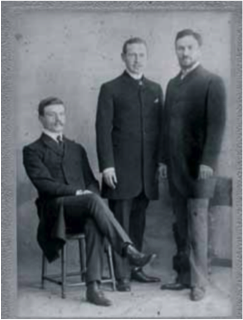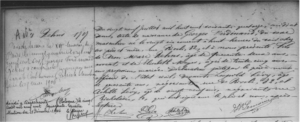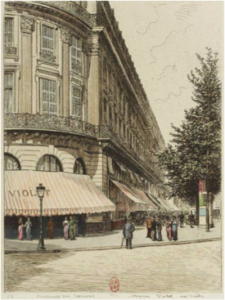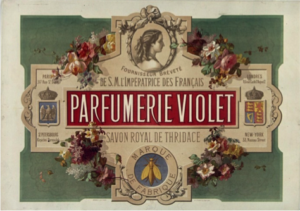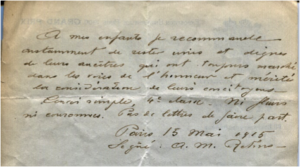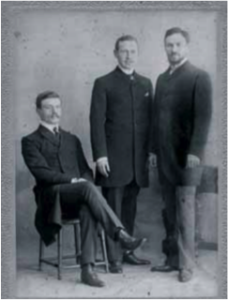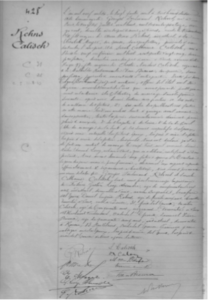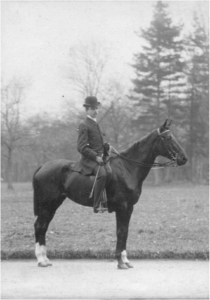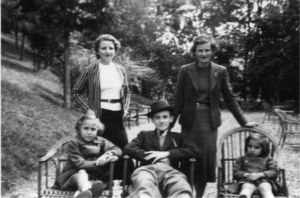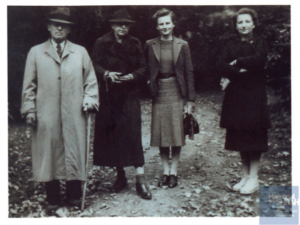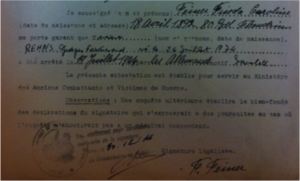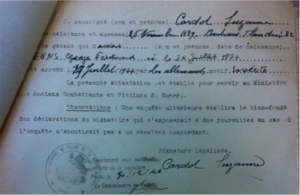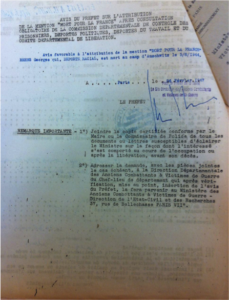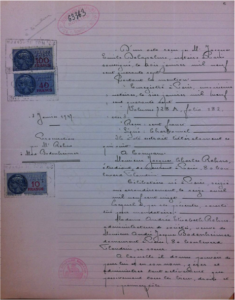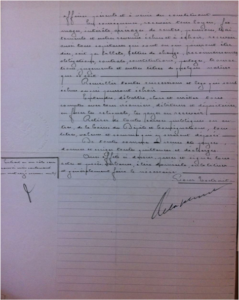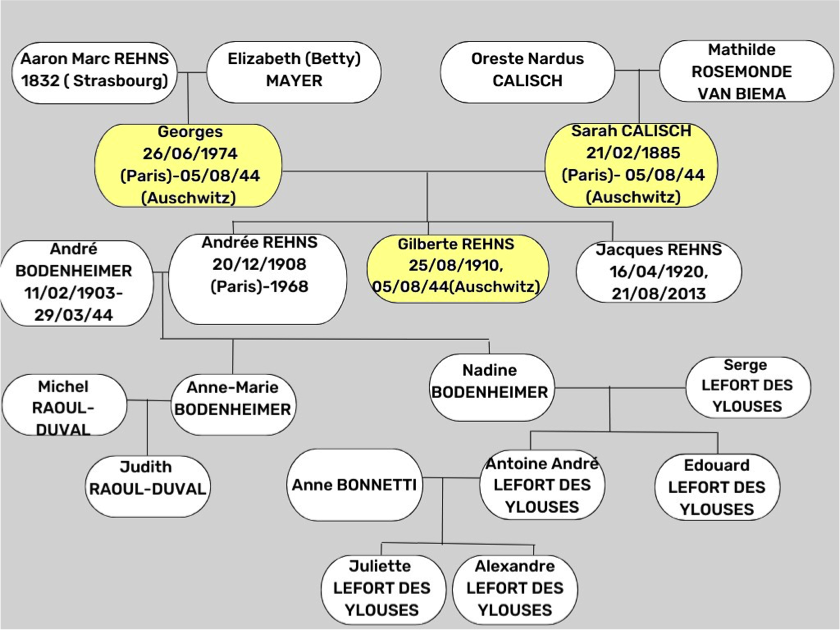Georges REHNS
This project was carried out by a group of 9th grade students at the Victor Duruy middle school in Châlons-en-Champagne, in the Marne department of France. They volunteered to work on it in their spare time, with the guidance of their history and geography teacher. The six students, who had been made aware of the importance of remembering the Holocaust through a cross-disciplinary practical program called “Chemins de mémoire” (“Pathways of Remembrance”), focused on a family group who were deported together, the Rehns family: Georges, Sarah and Gilberte.
Starting in February, the group met for 2 hours every other week and began going through the records provided by the Convoy 77 team. The students worked in pairs on each member of the family, and they soon began to wonder whether there were any surviving descendants of this family, given that Gilberte had a brother and a sister. They trawled the Internet using official websites such as those of the Shoah Memorial and Yad Vashem, as well as genealogy sites, and were soon able to draw up a family tree of the Rehns family’s ancestors and descendants, including their daughter, Andrée Bodenheimer.
They discovered that both of his daughters had been married. The first, Nadine, was married to a Mr. Lefort des Ylouses, while the second, Anne-Marie, was married to a Mr. Duval. As one surname is more common than the other, they started looking for descendants of the “Lefort des Ylouses” family on the Internet and came across “Juliette Lefort des Ylouses”, to whom they wrote a letter on March 7, 2023, although they were unsure if the mailing address that they had for her was correct. On March 15, we received a reply by email, and we had indeed made contact with the descendants of the Rehns family! After several e-mail messages, Mrs. Nadine Lefort des Ylouses (Juliette’s grandmother and Georges and Sarah’s granddaughter) was keen to speak with the six students, and we arranged a videoconference on April 14. The students had their questions ready in advance and during the discussion they were able to expand their knowledge about the Rehns family. Mrs. Lefort kindly sent us some photos, together with the book she had written about her family for her children, thus providing us with reliable and accurate information.
When our research was completed at the beginning of July, I sent it to Mrs. Lefort for review and to ask her permission to share it with the Convoy 77 project. She replied: “I have just read all the material you sent me, and I would like not only to give you my approval, but also to congratulate you (and your students) on the marvelous work you have accomplished”.
Sadly, Mrs. Lefort passed away at the end of August. However, my students and I are happy to have contributed to preserving the memory of her family through this project, and we feel very fortunate to have had the opportunity to meet her and talk with her.
Cécile Boudes
1) Before the war
Georges Ferdinand Rehns was born on July 26, 1874 in the 4th district of Paris, France. His parents were Aron-Marc Rehns and Elisabeth Mayer.
Georges Rehns’ birth certificate
Georges’ father, who was born into an old family from Alsace, in the east of France, initially settled in Strasbourg, where he worked as a lawyer. In 1872, after Germany annexed Alsace-Lorraine, he refused to live under German rule and decided to move to Paris.
It was at this time that Aaron-Marc Rehns bought a luxury perfume and cosmetics company called Violet, which was based at 12, boulevard des Capucins in Paris. He grew the business and, thanks to him, it was listed on the stock exchange and expanded internationally. The perfumery was the official supplier to Empress Eugénie and Queen Isabelle II of Spain. Even to this day, the Empress’s emblem, a bee, is featured on every bottle.
In 1906, Aaron-Marc founded an orphanage for Jewish boys in Haguenau, in the Bas-Rhin department of France. In his will, in addition to passing on the business to his sons, he wrote: “I urge my children to remain united and worthy of their ancestors, who have always trod the path of honor and earned the respect of their fellow citizens.”
The will of Aron-Marc Rehns, Georges’ father
Georges had two brothers, Eugène, to whom he was very close, and Marc, who died quite young.
A photo of Georges standing between his two brothers, Eugène and Marc
When his father died, Georges found himself, together with his brother Eugène, in charge of the company. However, when the Germans occupied France, he was no longer allowed to run the business. His granddaughter, Nadine Lefort des Ylouses, believes that he kept the business dormant during the war.
As of October 18, 1940, a German decree stipulated that Jewish businesses had to be registered, and as of March 29, 1941, the Commissariat aux Questions Juives (“Commission for Jewish Affairs”) was responsible for the “Aryanization” of Jewish businesses. In April 1941, a third decree extended the ban on Jews working in certain professions to the entire commercial sector
One of Georges’ cousins, Jean Alexandre Rehns, took over the company for several years but it was not a success and he quit in 1955[2].
In 1923, Georges and his brother Eugène bought a tenement building at 68, rue de la chaussée d’Antin, which his descendants still own. However, he and his family lived in a rented apartment at 80 boulevard Flandrin in the 16th district of Paris.
On April 24, 1906, Georges married Sarah Calish and the couple went on to have three children: Andrée, born on December 20, 1908, Gilberte, born on October 25, 1910, and Jacques, born on August 16, 1920.
Civil status register from the town hall of the 16th district of Paris
Georges and Sarah’s marriage certificate
It says: “In the year 1906, on the twenty-fourth of April at three o’clock in the afternoon, marriage record of Georges Ferdinand Rehns, born in Paris on the twenty-sixth of July one thousand eight hundred and seventy-four, merchant, residing with his father and mother in Paris, on rue de la Faisanderie, 40, adult son of Aron Marc Rehns, industrialist, and of Elisabeth Mayer, his wife, of no profession, present and consenting on the one hand and Sarah Catherine Calisch born in Paris on February twenty-first, one thousand eight hundred and eighty-five, of no profession residing with her father and mother avenue Victor Hugo 97, daughter of age of Oreste Nardus Calisch, merchant and Mathilde Rosamunde Van Biema his wife, of no profession, present and consenting on the other hand. Drawn up by us, Edgar Berthemet, deputy mayor, registrar of the sixteenth district of Paris, who have proceeded publicly in the town hall to the celebration in the following form: after having read to the parties 1° the birth certificates of the future spouses, 2° the publications made in this town hall on Sundays, April 8th and 15th, without opposition; all the aforementioned documents duly initialed and appended,3° chapter 6 of the book and of the civil code (title of marriage) on the respective rights and duties of the spouses, after having questioned the spouses, the father and mother of the future husband, and the father and mother of the future wife, who declared to us that a marriage contract had been drawn up on the twenty-third of April before Mr. Edmond Leroy, notary in Paris, who issued a certificate which was produced to us, We have asked the future spouses if they wish to take each other as husband and wife, each of them having answered affirmatively and separately out loud, We have pronounced in the name of the law that Georges Ferdinand Rehns and Sarah Catherine Calisch are united in marriage in the presence of Frédéric-Gaston Levy-Alexandre, aged fifty-two, industrialist residing in Paris avenue Bugeaud,1 brother-in-law of the groom, Daniel Eugène Rehns aged thirty-five, … ……. residing in Paris, rue Lapérouse, 31, brother of the husband; Martin Calisch, aged fifty, merchant, residing in Paris, 48 rue Saint Ferdinand, uncle of the wife, Samuel Van Biema, aged forty-five, industrialist, residing in Rouen, 83 rue Thiers, uncle of the wife, witnesses who have signed with the husband, the father and mother of the husband, the father and mother of the wife, and us after having read the document”.
Georges and Sarah were well-off, but the only outward sign of wealth Georges showed was his membership of the Automobile Club, where he took up fencing. The club was private and for men only.
Georges on a horse
2) During the war
During the exodus from Paris, the family took refuge in Bagnoles-de-l’Orne, a small town in Lower Normandy, where they had friends. Georges, Sarah, Gilberte, Jacques, Andrée and her two granddaughters, Nadine and Anne-Marie, spent a year in a house with a garden that the Rehns family had rented. Andrée’s mother-in-law, Hedwige Bodenheimer, went to stay with them, as did her husband, André Bodenheimer, after he was demobilized.
Andrée and Gilberte (standing), with Nadine, Jacques and Anne-Marie
at Bagnoles-de-l’Orne
After that, the family got on with their lives. For much of the war, Sarah, Georges and their youngest daughter Gilberte stayed in their apartment on rue Flandrin. They did not go into hiding, but there the constant worry that they might be arrested.
Georges, Sarah, Gilberte and Andrée
There were two occasions on which they could have left France. Sarah’s sister, Elise, who lived in England, offered to take them in and their eldest daughter, Andrée Bodenheimer, had connections in New York, which meant they could have gone to the USA. However, Georges and Sarah were attached to France, to their lifestyle and living comfortably, and felt that their French citizenship would provide them with some protection; besides, they were getting on in years. According to their granddaughter, Ms. Lefort des Ylouses, they were unaware of the risk that they and their family were running, given that the Bodenheimer family did not want to leave France without them.
They stayed in Paris and got on with their lives for four years, despite the anti-Semitic laws introduced by the Germans and the Vichy government, which restricted their rights and freedoms (for example, they could only go out at certain times and were not allowed to go to the movies). On October 3, 1940, the Rehns family was deeply affected by the 1st decree on the status of Jews, and then by the census of Jews, the “Aryanization” of property, the ban on working in a number of occupations, and, as of May 29, 1942, the requirement to wear a yellow star.
They lived in fear that the militia or the Gestapo could descend on their home any day.
3) Arrest and deportation
This eventually happened on July 19, 1944, at a time when the Allied forces had already liberated some areas of France following the Normandy landings on June 6, 1944. The people of Paris, no doubt including the Rehns family, were looking forward to the liberation of the city, as the summer was unusually hot that year and the restrictions were becoming increasingly severe. On July 14, there were demonstrations all over Paris, with people singing the Marseillaise and waving the French flag. This was strictly forbidden, but the Germans hardly reacted at all.
Nevertheless, Aloïs Brunner, the commandant of Drancy camp, decided to deport as many Jews as possible who had, until then, avoided the roundups. The Gestapo came knocking on Rehns family’s door and arrested Sarah, Georges and Gilberte simply because they were Jews.
Suzanne Cardol and Frieda Feiner, maids, janitors and neighbors who were there that day, later testified that they family was arrested “by the Germans”, “because they were Jewish”.
Frieda Feiner’s testimony,
given in Paris on December 30, 1946
Suzanne Cardol’s testimony,
given in Paris on December 30, 1946
Georges was interned in the Drancy transit camp, where he was registered as an “Israelite” (Jew) and assigned the registration number 25,258. He was held from July 19 through July 30. Along with Sarah and Gilberte, he was deported on Convoy 77, which left Bobigny station on July 31, 1944, bound for the Auschwitz-Birkenau concentration camp. He and his family were not taken into the camp for work and had no chance of survival, as the Nazis sensed that the end of the war was approaching, and they were executed as soon as they arrived. Their official date of death is August 5, 1944.
4) After the deportation
On December 30, 1946, Georges’ daughter Andrée, who was deported on Convoy No. 71 but survived her time in Auschwitz, and his son Jacques, who joined the Allied Forces after travelling to Spain, applied to have their parents and sister recognized as having “died for France”. Their request was granted on February 26, 1947.
Notice issued by the Prefect on the granting of the title “died for France”,
dated February 26, 1947
At the end of the war, Jacques, Andrée and her two daughters, Nadine and Anne-Marie, moved into the apartment at 80 boulevard Flandrin, which had not been looted by the Germans because Paris was liberated on August 25, 1944. Andrée’s mother-in-law, Hedwige Bodenheimer, moved in with them.
No doubt traumatized after having been deported and losing her husband and parents, Andrée spoke very little about her time in the camp when she returned to France.
The family inherited Georges and Sarah’s estate, as stipulated in a notarized deed dated January 3, 1947.
It is thanks to the book written by Nadine Lefort des Ylouses that the family history has been passed on to the younger generation, and will continue to be so in future.
Family tree drawn up by 9th grade students
Louis Ambrosi and Nathan Joseph
All the photos were provided by Nadine Lefort des Ylouses, Georges and Sarah Rehns’ granddaughter, together with the book, “Yesterday and Now”, which she wrote for her family. She also kindly gave us permission to publish them here on the Convoy 77 website.
In April 2023, the students had the opportunity to speak with Mrs. Lefort des Ylouses during a video call, and also to ask her questions to help them expand their knowledge about the family.
- Photo of Boulevard Flandrin: https://commons.wikimedia.org/wiki/File:80-82_boulevard_Flandrin.jpg
- Shoah Memorial website: https://www.memorialdelashoah.org/
- Memorial resources: http://www.enseigner-histoire-shoah.org/outils-et-ressources/documents-darchives/persecutions-des-juifs-de-france.html
- Photo of the Violet perfume factory: https://www.maisonviolet.com/pages/la-maison


 Français
Français Polski
Polski